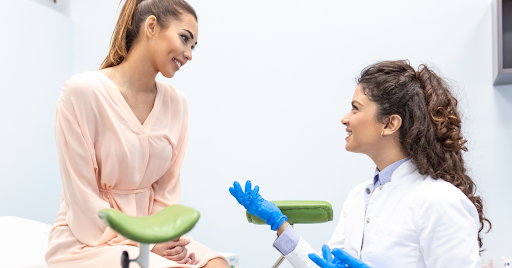Talking about your body, your sexual behavior, and personal concerns can be awkward and uncomfortable. While talking with your gynecologist should never be accompanied by shame, it can be hard to actually sit down and discuss private topics like sex, pregnancy, or STDs. However, your gynecologist’s main job is to hear your concerns and ensure your physical and reproductive health is sound.
Questions For Your Gynecologist
Many women will have questions about their menstrual cycle, contraception, sexual activity, and more during a typical visit— which is a natural part of being a woman! Although it’s not always easy to talk about these things with your doctor, here at Raleigh OB/GYN, we’re here for you. We want to hear about your concerns so that we can help you address them and make sure you feel comfortable during your appointments.
1. Are There Ways I Can Mitigate My Period Symptoms?
If you are a woman experiencing severe period cramps or a super-heavy flow, your gynecologist wants to know. Believe it or not, you don’t have to suffer through these symptoms every month. Your gynecologist can help determine whether your period pain is caused exclusively by the menstrual period (primary) or caused by another condition in the reproductive system (secondary dysmenorrhea). From there, your gynecologist can prescribe treatment that will help you manage your symptoms.
2. Is This Much Discharge Normal?
Discharge can be very alarming, especially because it can vary in amount and color. But have no fear, discharge is very normal and even serves several purposes, including cleaning and helping to prevent and fight infections. Normal vaginal discharge can vary, but is often somewhat thin or thick, clear or white, with minimal odor. If you see a change in vaginal discharge, such as a change in odor, color, or texture accompanied by vaginal itching, burning, or swelling, it is important to contact your doctor. Regardless of the appearance of your discharge, if you have any questions about vaginal fluids, your gynecologist is there to help.
3. How Do I Decide Which Birth Control Is Best For Me?
Navigating all the different contraceptive options can be challenging. Depending on your individual circumstances, your doctor can provide more information about safety, effectiveness, side effects, and other considerations to help inform your decision. Some of the most common forms of birth control include the pill, the patch, a hormonal vaginal ring, a birth control shot, an intrauterine device (IUD), or a birth control implant.
4. Why Is It Painful When I Have Sex?
We get it— talking about sex with your doctor isn’t a particularly fun way to spend your day. However, if you are experiencing painful sex, your gynecologist will want to know. In fact, this is a prevalent issue that gynecologists deal with on a day-to-day basis. According to ACOG, pain during intercourse is very common, with nearly 3 out of 4 women experiencing pain during intercourse at some point during their lives. Some of the most common causes of painful intercourse include
- Lack of lubrication
- Injury or irritation
- Endometriosis
- Irritable bowel syndrome (IBS)
- Vaginismus
Your gynecologist can help you detect the underlying cause of painful intercourse and get you the treatment you need to improve your sex life.
At Raleigh OB/GYN, we believe that patient education is an invaluable tool. For that reason, our doctors and staff are committed to providing patient care in a nurturing, supportive environment. We want to ensure you understand everything about your body as a woman and have the resources to get all your questions answered. If you have unanswered questions, your gynecologist can help. Schedule an appointment through our website or give us a call at (919) 876-8225.


